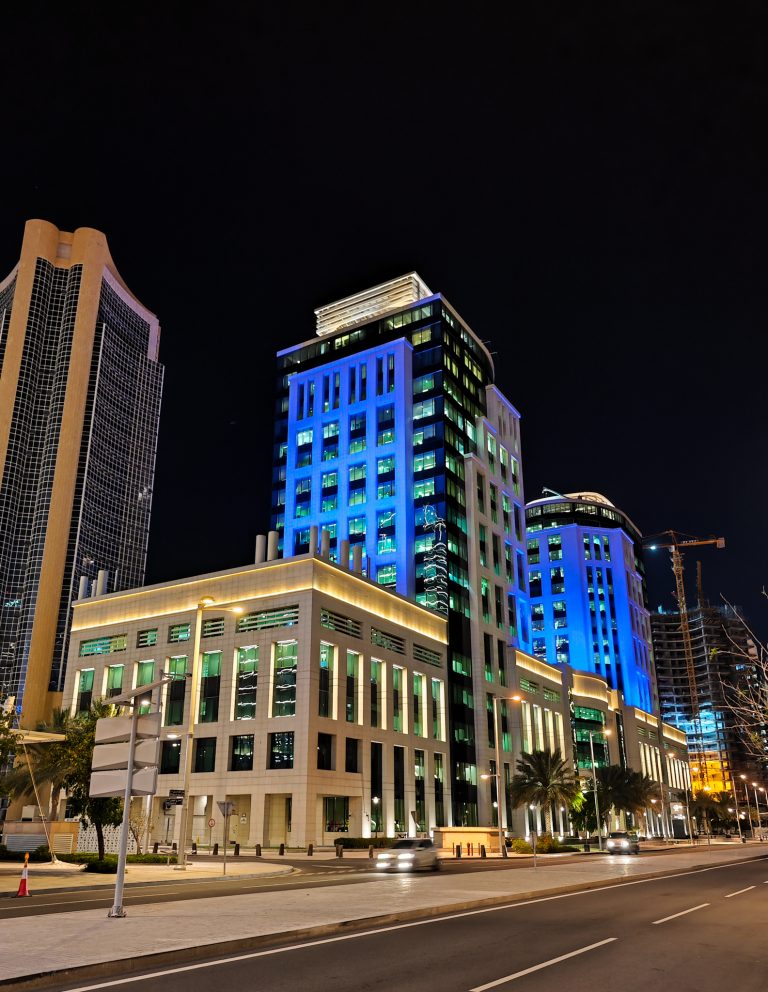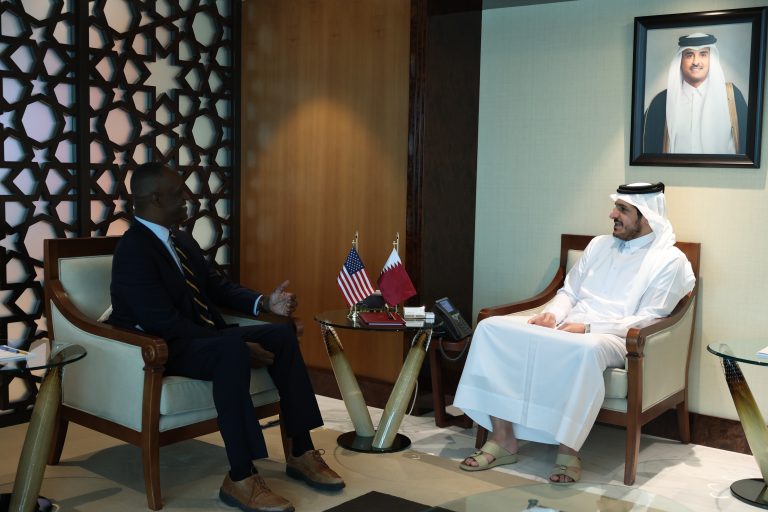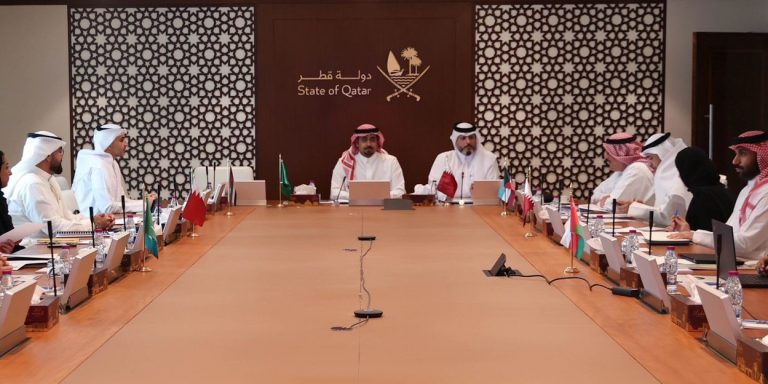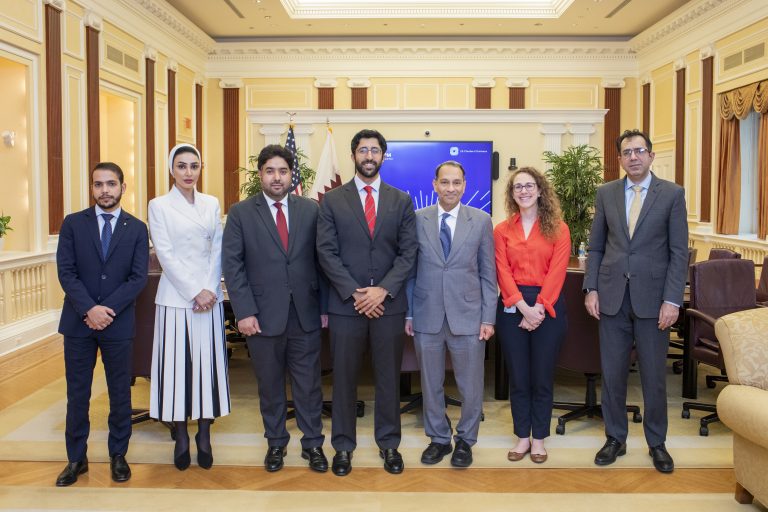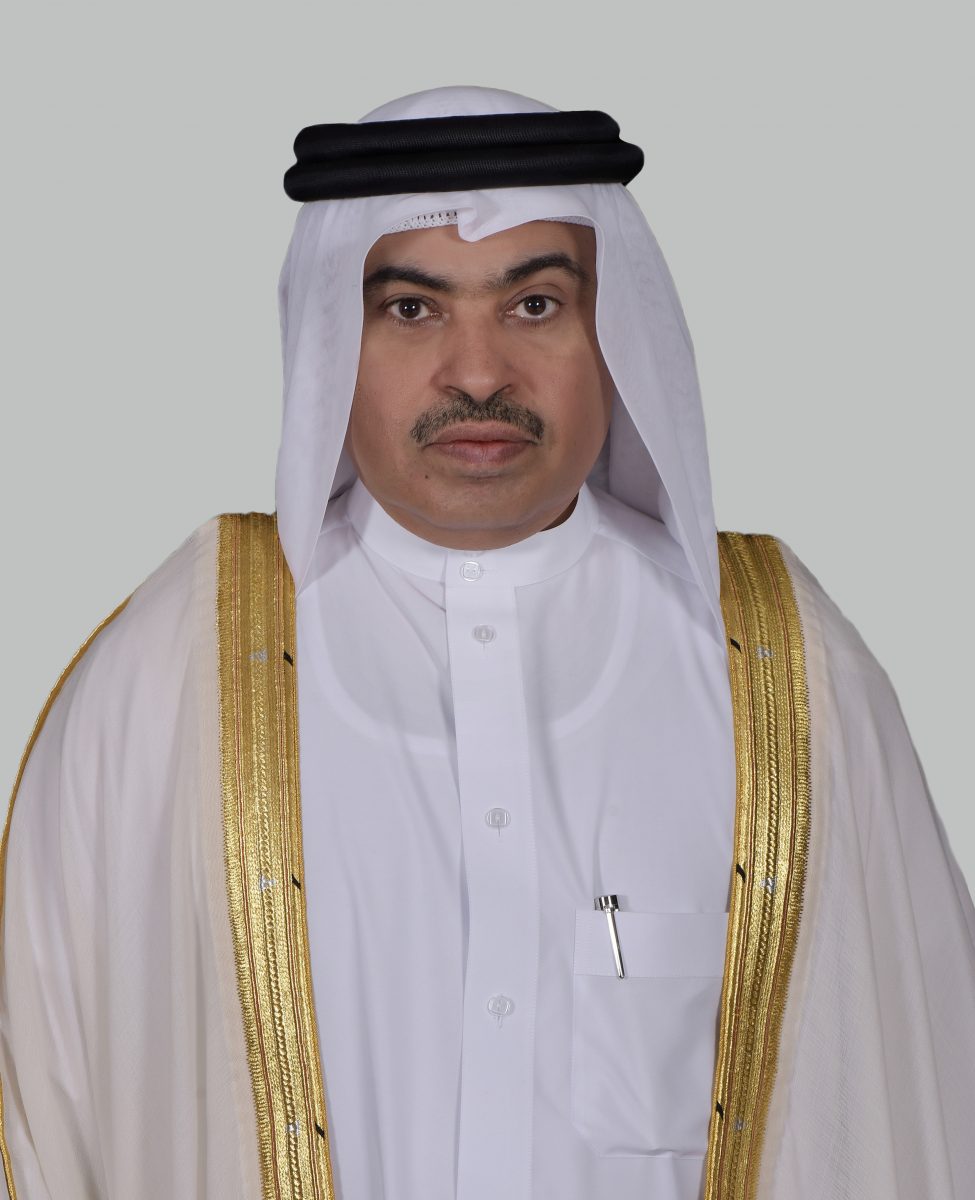
Doha – June 22, 2021:
His Excellency Mr. Ali bin Ahmed Al Kuwari, Minister of Commerce & Industry and Acting Minister of Finance, participated in a virtual session entitled ‘At the Heart of Global Trade’, within the framework the third session of the Qatar Economic Forum Powered by Bloomberg, themed ‘Power and Trade Flows’.
During his intervention in the session, H.E. said that the 2021 State Budget was based on a conservative average oil price assumption of US $40 per barrel, and the estimated total revenue for the fiscal year 2021 was QR 160.1 billion. This reflects a continued policy of conservative revenue estimation to maintain a fiscal balance and minimize the impact of the fluctuation in energy prices on the State Budget, H.E. clarified.
An amount of QR 72.1 billion has been allocated for major projects in the 2021 Budget, H.E. stated, further explaining that this sum includes an allocation for new projects along with ongoing development projects in various sectors, including those related to hosting the FIFA World Cup Qatar 2022™. It also includes allocations for citizens’ land development projects and related infrastructure.
H.E. said the State continued to give priority to the education and healthcare sectors. Allocations for the education sector amounted to QR 17.4 billion, including spending to expand schools and other educational facilities. Allocations for the health care sector amounted to QR 16.5 billion, covering additional high-priority projects to further promote and expand medical and healthcare facilities scheduled to be implemented during 2021, H.E. revealed.
H.E. stressed Qatar’s keenness to continue working towards achieving the plans, programs and projects of the National Development Strategy related to the four interrelated pillars of Qatar National Vision 2030: Human Development, Social Development, Economic Development and Environmental Development.
The State has sought to encourage government agencies to continue implementing programs that enhance the efficiency of public spending and the achievement of financial sustainability, H.E. stated.
H.E. Mr. Al Kuwari pointed out that the State had worked to diversify non-oil revenue sources to support the financial resources of the Public Budget, back small and medium-sized enterprises (SMEs) and grant the private sector a major role in the development process and increase its participation in the implementation of major projects.
Qatar has sought to provide a conducive environment that is attractive to local and foreign investment in various economic sectors, thus helping to build a diversified and strong economy, H.E. Mr. Al Kuwari indicated.
H.E. addressed the issue of trade and investment priorities, noting that the some of the key highlights of Qatar’s outlook include implementing long-term economic diversification and infrastructure development plans, maintaining a strong trade balance position with the State’s trade partners, enhancing the resilience and competitiveness of exports and preserving the stability of the banking sector.
H.E. pointed out that the country’s efforts to diversify its import markets while streamlining procurement rules and import procedures had allowed Qatar to move on without interruption or delays with major infrastructure projects, despite the challenges the region has witnessed. As an example, H.E. mentioned the Doha Metro, which was delivered ahead of schedule, as well as the various sporting arenas that will be used for the FIFA World Cup next year.
H.E. Mr. Al Kuwari stated that Qatar had realized the role of international trade in achieving its future development goals. Thus, the State proceeded to further liberalize its domestic markets to foreign investors across the economy, particularly in knowledge-intensive areas and real estate, H.E. further clarified.
H.E. Mr. Al Kuwari added that the State had taken many steps to achieve these goals, including establishing the Investment Promotion Agency of Qatar (IPA Qatar), overhauling the public procurement framework, enacting a new foreign investment incentives law and amending the free zone system. The IPA Qatar aims to streamline the government’s efforts aimed at encouraging foreign investment at home, H.E. Mr. Al Kuwari explained.
Sector-wise, the IPA’s strategy is focused on tourism, advanced manufacturing and infrastructure, as well as agriculture and technology development, H.E. pointed out, stating that the IPA had signed several Memorandums of Understanding with other promotion agencies.
Furthermore, H.E. assured that Qatar was working on several additional measures to further facilitate trade flow and boost investment that include an import to re-export system; the acceptance of electronic certificates of origin and electronic certification of invoices associated with imports; accepting commercial invoices issued from a non-export or production country; the use of private customs warehouses; updating the customs refund process; the use of the ATA Carnet; the implementation of a new risk management system; industrial exemptions; the implementation of pre-clearance of shipments; and the use of authorized economic operators.
H.E. added that these efforts had contributed to reducing the transaction costs in all economic sectors, one of the core economic development objectives, and an important part of the initiatives aimed at facilitating trade and investment.
Moreover, H.E. the Minister of Commerce & Industry and the Acting Minister of Finance also touched on the long-term economic and commercial legacy of the FIFA World Cup Qatar 2022™, explaining that this global event had contributed to providing many opportunities to diversify the Qatari economy, stimulate its growth and competitiveness and attract investments.
Qatar is focused on building the industries that will help deliver efficiently in 2022 and contribute to the nation’s sustainable economic development in the years to come, H.E. Mr. Al Kuwari affirmed.
H.E. also added that the State’s efforts to send trade missions to countries that have extensive experience in hosting major sporting events, and welcoming business and governmental delegations in the State of Qatar had contributed to enhancing the role of foreign investment in the Qatari economy, and establishing the nation as a stable investment destination, both politically and economically.
Speaking about climate change, H.E. assured that the State of Qatar took the issue of climate change very seriously. Qatar has demonstrated that through hosting several major events related to combating climate change such as COP18 in 2012 and other similar events, H.E. added.
Additionally, Qatar is one of the most prominent signatories to major international climate change agreements and treaties such as the Paris Agreement and Kyoto Protocol, H.E. Mr. Al Kuwari further stated. Furthermore, Qatar has made international pledges in that regard. For example, it pledged US $100 million for support of small and developing island-nations and least developed states to deal with climate change. H.E. also mentioned that Qatar had appointed a Special Envoy for Climate Change and Sustainability, H.E. Ambassador Omar Ismail Al-Dafa.
Agricultural production in Qatar has been restricted to protect its water sources, H.E. said, further stating that Qatar’s tourism development strategy now includes the promotion of eco-friendly activities.
During the dialogue session, a spotlight was directed at the changes taking place in the global economy. H.E. Mr. Al Kuwari stated that governments had played a key role in facing the current crisis, pointing to the failure of ordinary mechanisms to reduce the risk of economic stagnation. H.E. added that governments worldwide had adopted innovative policies to soften the social and economic consequences of the COVID-19 pandemic.
H.E. Mr. Al Kuwari touched on the strategy established by the State to preserve the health of society members, market stability and the balance of the national economy in a comprehensive and sustainable manner. H.E. called on nations to work side by side to build a more equitable and stable future in cooperation with the relevant international organizations, to achieve recovery and allow fair and comprehensive access to vaccines.
This crisis has provided the State with an important opportunity to accelerate the implementation of a set of measures to build a stronger and more sustainable economy, including an endeavor to diversify revenue and improve efficiency in spending.
The current adversity presents nations, collectively, with the chance and the responsibility to build a stronger global economic foundation that will benefit all peoples and future generations, H.E. Mr. Al Kuwari stated.
At the conclusion of his intervention on economic changes at the local and regional levels during the next five years, H.E. stressed that Qatar’s response to the economic shocks of 2020 through implementing preventive measures translated its continuous efforts and commitment to its long-term goals of achieving financial stability and economic growth, noting that the State had succeeded in enhancing its resilience and overcoming the double-barreled economic shock that the world witnessed due to the drop in oil prices and the preventive measures put in place to curb the pandemic.
H.E. Mr. Al Kuwari pointed at the need to work with both local and international partners to achieve economic recovery in the region and the world, highlighting Qatar’s determination to continue implementing economic and financial development plans to achieve the goals of the Qatar National Vision 2030.
The session, ‘At the Heart of Global Trade’, moderated by Ms. Simone Foxman, Middle East Correspondent for Bloomberg Television, is aimed at highlighting the strategic location Qatar has at the crossroads of Asia, Africa, and Europe, and its pivotal role in facilitating global trade flows.
It is noteworthy that the Qatar Economic Forum Powered by Bloomberg, taking place via video conferencing, welcomes a global delegation of more than 2,000 government leaders, chief executives, influential voices and decision-makers in the fields of finance, economics, investment, technology, energy, education, sports and climate.
The agenda of the Forum, taking place from June 21 until June 23, entails six main themes: ‘Technology Advanced’ which takes a closer look at permanent changes to the human-technology nexus; ‘A Sustainable World’ exploring the intersection of capitalism and climate; ‘Markets and Investing’ posing the question of whether investors, in their inexorable pursuit of growth opportunities, can shape a more resilient global economy; ‘Power and Trade Flows’ which gathers global power brokers to share their vision of the road ahead; ‘The Changing Consumer’ looking into the future of commerce; and ‘A More Inclusive World’ which will offer ideas for healing fissures in a post-pandemic society.
-Ends-




